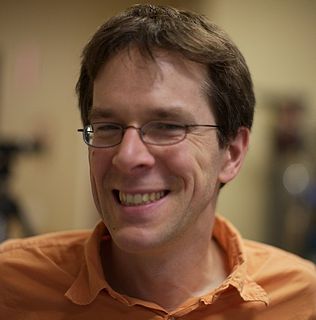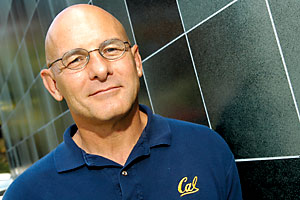Related Research Articles
The Association for Computing Machinery (ACM) is an international learned society for computing. It was founded in 1947, and is the world's largest scientific and educational computing society. The ACM is a non-profit professional membership group, with nearly 100,000 members as of 2019. Its headquarters are in New York City.

The ACM A.M. Turing Award is an annual prize given by the Association for Computing Machinery (ACM) to an individual selected for contributions "of lasting and major technical importance to the computer field". The Turing Award is generally recognized as the highest distinction in computer science and the "Nobel Prize of computing".

Sir Charles Antony Richard Hoare, is a British computer scientist. He developed the sorting algorithm quicksort in 1959/1960. He also developed Hoare logic for verifying program correctness, and the formal language communicating sequential processes (CSP) to specify the interactions of concurrent processes and the inspiration for the occam programming language.

Leslie B. Lamport is an American computer scientist. Lamport is best known for his seminal work in distributed systems and as the initial developer of the document preparation system LaTeX. Leslie Lamport was the winner of the 2013 Turing Award for imposing clear, well-defined coherence on the seemingly chaotic behavior of distributed computing systems, in which several autonomous computers communicate with each other by passing messages. He devised important algorithms and developed formal modeling and verification protocols that improve the quality of real distributed systems. These contributions have resulted in improved correctness, performance, and reliability of computer systems.

Robert Tappan Morris is an American computer scientist and entrepreneur. He is best known for creating the Morris Worm in 1988, considered the first computer worm on the Internet.
Alan Jay Perlis was an American computer scientist and professor at Purdue University, Carnegie Mellon University and Yale University. He is best known for his pioneering work in programming languages and was the first recipient of the Turing Award.

John Leroy Hennessy is an American computer scientist, academician, businessman, and Chair of Alphabet Inc. Hennessy is one of the founders of MIPS Computer Systems Inc. as well as Atheros and served as the tenth President of Stanford University. Hennessy announced that he would step down in the summer of 2016. He was succeeded as President by Marc Tessier-Lavigne. Marc Andreessen called him "the godfather of Silicon Valley."

David Andrew Patterson is an American computer pioneer and academic who has held the position of Professor of Computer Science at the University of California, Berkeley since 1976. He announced retirement in 2016 after serving nearly forty years, becoming a distinguished engineer at Google. He currently is Vice Chair of the Board of Directors of the RISC-V Foundation, and the Pardee Professor of Computer Science, Emeritus at UC Berkeley.

Charles Eric Leiserson is a computer scientist, specializing in the theory of parallel computing and distributed computing, and particularly practical applications thereof. As part of this effort, he developed the Cilk multithreaded language. He invented the fat-tree interconnection network, a hardware-universal interconnection network used in many supercomputers, including the Connection Machine CM5, for which he was network architect. He helped pioneer the development of VLSI theory, including the retiming method of digital optimization with James B. Saxe and systolic arrays with H. T. Kung. He conceived of the notion of cache-oblivious algorithms, which are algorithms that have no tuning parameters for cache size or cache-line length, but nevertheless use cache near-optimally. He developed the Cilk language for multithreaded programming, which uses a provably good work-stealing algorithm for scheduling. Leiserson coauthored the standard algorithms textbook Introduction to Algorithms together with Thomas H. Cormen, Ronald L. Rivest, and Clifford Stein.
ACM SIGACT or SIGACT is the Association for Computing Machinery Special Interest Group on Algorithms and Computation Theory, whose purpose is support of research in theoretical computer science. It was founded in 1968 by Patrick C. Fischer.
Patrick M. Hanrahan is a computer graphics researcher, the Canon USA Professor of Computer Science and Electrical Engineering in the Computer Graphics Laboratory at Stanford University. His research focuses on rendering algorithms, graphics processing units, as well as scientific illustration and visualization.

Michael Kölling is a German computer scientist, best known for the development of the BlueJ and Greenfoot educational development environments and as author of introductory programming textbooks. In 2013 he received the 2013 SIGCSE Award for Outstanding Contribution to Computer Science Education for the development of the Blue programming language and environment.
The International Symposium on Computer Architecture (ISCA) is an annual academic conference on computer architecture, generally viewed as the top-tier in the field. Association for Computing Machinery's Special Interest Group on Computer Architecture and Institute of Electrical and Electronics Engineers Computer Society are technical sponsors.
Professor Chung Laung (Dave) Liu (劉炯朗), or C. L. Liu is an ethnic Chinese computer scientist. Born in Guangzhou, he spent his childhood in Macau. He received his B.Sc. degree in Taiwan, Master's degree and doctorate in United States.

Kurt Mehlhorn is a German theoretical computer scientist. He has been a vice president of the Max Planck Society and is director of the Max Planck Institute for Computer Science.
Johannes Gehrke is a German Computer Scientist and a Technical Fellow in the Enterprise and Devices Group at Microsoft known for his work in database systems, distributed systems, and data mining. He is an ACM Fellow and the recipient of the 2011 IEEE Computer Society Technical Achievement Award. From 1999 to 2015, he was a faculty member in the Department of Computer Science at Cornell University, where from 2012 to 2015 he was the Tisch University Professor of Computer Science.
Eugene Leighton (Gene) Lawler was an American computer scientist, a professor of computer science at the University of California, Berkeley.
Knut Schoch is a German tenor in opera and concert as a specialist in the field of historically informed performance, and an academic voice teacher.
The ACM Eugene L. Lawler Award is awarded every two or three years by the Association for Computing Machinery to an individual or a group of individuals who have made a significant contribution to the use of information technology for humanitarian purposes in a wide range of social domains. It is named after the computer scientist Eugene Lawler. The award includes a financial reward of US $ 5,000.

Alexander L. Wolf is a Computer Scientist known for his research in software engineering, distributed systems, and computer networking. He is credited, along with his many collaborators, with introducing the modern study of software architecture, content-based publish/subscribe messaging, content-based networking, automated process discovery, and the software deployment lifecycle. Wolf's 1985 Ph.D. dissertation developed language features for expressing a module's import/export specifications and the notion of multiple interfaces for a type, both of which are now common in modern computer programming languages.
References
- ↑ "ACM Award for UHasselt Prof. Johannes Schöning". Hasselt University. Retrieved 23 January 2014.
- ↑ "ACM Eugene L. Lawler Award page". ACM. Retrieved 29 January 2014.
- ↑ "Profile of Johannes Schöning at the University of Bremen". University of Bremen. Retrieved 23 January 2014.
- ↑ "Johannes Schöning featured at tijd" . Retrieved 16 March 2015.
| This article about a German scientist is a stub. You can help Wikipedia by expanding it. |